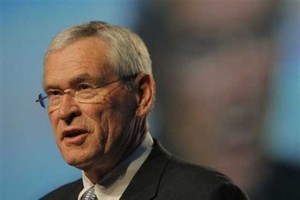Eyebrows rose when Edward Whitacre, Jr., General Motors’ new Chairman admitted that he had little knowledge of how the auto industry worked.
“I don’t know anything about cars. A business is a business, and I think I can learn about cars. I’m not that old, and I think the business principles are the same,” the 67 year-old Texan told Bloomberg News.
Known as “Big Ed,” Whitacre gained notoriety as the man who worked his way up from humble beginnings as a facility engineer at Southwestern Bell, in 1963, to become the top executive at the reconstituted AT&T. He earned a $158 million retirement package, in November 2005, after leading Baby Bell SBC’s acquisition of its one-time parent company – whose name the telecomm company adopted.
Experts say Whitacre’s experience at dealing with government oversight via the Federal Communications Commission, along with his extensive relationships with members of the House and Senate, made him the perfect choice for the GM post, as it works its way through government ownership.
“At the policy level he will be a very effective Chairman when it comes to cutting through the government bureaucracy,” says David Cole, Chairman of the Center for Automotive Research in Ann Arbor, MI, who does not expect Whitacre to stay at the helm of GM for an extended period of time, possibly leaving when the government sells off its stake in the company.
The fact that Whitacre was chosen by the Democratic Obama Administration still has some observers scratching their heads. The Texan has been a long-time supporter of Republican causes. And he was a top-level fundraiser for the two George W. Bush presidential campaigns. Whitacre achieved Bush Pioneer status by raising between $100,000 and $200,000 in 2000, and then graduated to Bush Ranger status by raising between $200,000 and $300,000 during the 2004 campaign.
Whitacre personally donated $8,300 to the primary and general election Presidential campaigns of Senator John McCain, in 2008. But he also gave $1,000 to Hillary Clinton’s campaign, during the 2008 Presidential primary, according to Federal Election Commission records, which do not show any contributions made to the Obama campaign.
Whitacre’s track record of building companies through acquisitions, he took Southwestern Bell and turned it into SBC in 1995 with a series of acquisitions that included Ameritech, Bell South, Pacific Teleis, Ameritech and, ultimately, AT&T, has some wondering if he hopes to duplicate this pattern at GM over the longer term.
During the debut of the General Motors Company last week, Whitacre said he doesn’t have any plans to make new acquisitions, but he does expect to be an “active” chairman. “I’m a hands-on walk around type of guy,” he said.
GM Vice Chairman Bob Lutz, meanwhile, told TheDetroitBureau.com that GM has no plans to “add brands again, that’s for sure.”
Still, the fact that Whitacre sees his role as being a hands-on chairman does cause some worry if he gets involved in product development. For the moment, at least, that seems to be an area where Whitacre will delegate authority to more knowledgeable automotive veterans, such as Lutz or GM’s chief executive, Fritz Henderson.
Another critical question that observers have been asking is how Henderson and Whitacre will get along. The CEO got his current post when, on March 31st, the White House effectively fired former Chairman and Chief Executive Officer Rick Wagoner. Wagoner was seen as unwilling and unable to take the steps the government demanded in return for a bailout that will ultimately be worth over $50 billion. Henderson was, however, open to the idea that GM might need to declare bankruptcy, as it ultimately did, on June 1st, to complete its reorganization.
At the June 10th GM news conference, Henderson and Whitacre appeared cordial. Observers will be watching closely to see if they can work together effectively. Henderson himself has indicated there will continue to be significant changes and cuts in GM’s executive ranks through the rest of the year. Whether he could be one of the next to leave is uncertain, but with Whitacre having the support of the Obama White House, which controls a 60% stake in the new General Motors, Henderson appears to be the more vulnerable of the two men, at least for now.
Paul A. Eisenstein, contributed to this report.



There is a lot to be said for an executive who understands business, has a fresh perspective and no internal loyalites. People questioned whether Lou Gerstner was the right choice for turning around IBM in 1993 given he had no computer industry experience. He was a master strategist, understood how to fix the balance sheet, and how to execute. He saved IBM. I am optimistic that Mr Whitacre has these same capabilities which will benefit GM and he wasn’t selected for purely his ability to navigate the government relationships.